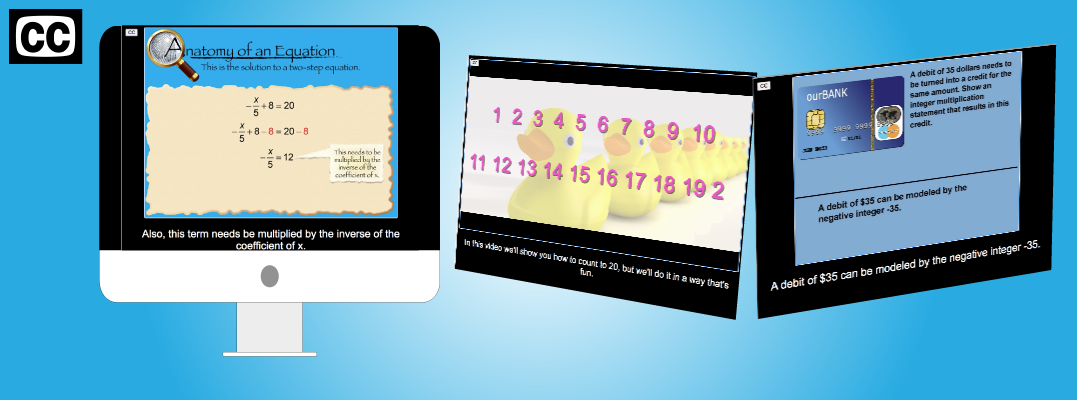Content Showcase: Closed Captioned Videos
Our videos are closed captioned. This isn't just an issue of accessibility but instruction. Try captioned videos with all your students. The captioning provides an additional level of support for your students as they work their way through our video library.
(Want to learn more about our subscription packages? Click here.)
| Title | Thumbnail Image | Description |
|---|---|---|
Closed Captioned Video: Algebra Applications: Linear Functions, Segment 2: Cycling |

|
Closed Captioned Video: Algebra Applications: Linear Functions, Segment 2: Cycling |
Closed Captioned Video: Algebra Applications: Data Analysis |

|
Closed Captioned Video: Algebra Applications: Data Analysis |
Closed Captioned Video: Algebra Applications: Data Analysis, 1 |

|
Closed Captioned Video: Algebra Applications: Data Analysis, 1 |
Closed Captioned Video: Algebra Applications: Data Analysis, 2 |

|
Closed Captioned Video: Algebra Applications: Data Analysis, 2 |
Closed Captioned Video: Algebra Applications: Data Analysis, 3 |

|
Closed Captioned Video: Algebra Applications: Data Analysis, 3 |
Closed Captioned Video: Algebra Applications: Data Analysis, 4 |

|
Closed Captioned Video: Algebra Applications: Data Analysis, 4 |
Closed Captioned Video: Algebra Applications: Exponential Functions |

|
Closed Captioned Video: Algebra Applications: Exponential Functions |
Closed Captioned Video: Algebra Applications: Exponential Functions, 1 |

|
Closed Captioned Video: Algebra Applications: Exponential Functions, 1 |
Closed Captioned Video: Algebra Applications: Exponential Functions, 2 |

|
Closed Captioned Video: Algebra Applications: Exponential Functions, 2 |
Closed Captioned Video: Algebra Applications: Exponential Functions, 3 |

|
Closed Captioned Video: Algebra Applications: Exponential Functions, 3 |
Closed Captioned Video: Algebra Applications: Exponential Functions, 4 |

|
Closed Captioned Video: Algebra Applications: Exponential Functions, 4 |
Closed Captioned Video: Algebra Applications: Functions and Relations |

|
Closed Captioned Video: Algebra Applications: Functions and Relations |
Closed Captioned Video: Algebra Applications: Functions and Relations, 1 |

|
Closed Captioned Video: Algebra Applications: Functions and Relations, 1 |
Closed Captioned Video: Algebra Applications: Functions and Relations, 2 |

|
Closed Captioned Video: Algebra Applications: Functions and Relations, 2 |
Closed Captioned Video: Algebra Applications: Functions and Relations, 3 |

|
Closed Captioned Video: Algebra Applications: Functions and Relations, 3 |
Closed Captioned Video: Algebra Applications: Functions and Relations, 4 |

|
Closed Captioned Video: Algebra Applications: Functions and Relations, 4 |
Closed Captioned Video: Algebra Applications: Inequalities |

|
Closed Captioned Video: Algebra Applications: Inequalities |
Closed Captioned Video: Algebra Applications: Inequalities, 1 |

|
Closed Captioned Video: Algebra Applications: Inequalities, 2 |
Closed Captioned Video: Algebra Applications: Inequalities, 2 |

|
Closed Captioned Video: Algebra Applications: Inequalities, 1 |
Closed Captioned Video: Algebra Applications: Linear Functions |

|
Closed Captioned Video: Algebra Applications: Linear Functions |
Closed Captioned Video: Algebra Applications: Linear Functions, 1 |

|
Closed Captioned Video: Algebra Applications: Linear Functions, 1 |
Closed Captioned Video: Algebra Applications: Linear Functions, 3 |

|
Closed Captioned Video: Algebra Applications: Linear Functions, 3 |
Closed Captioned Video: Algebra Applications: Linear Functions, 4 |

|
Closed Captioned Video: Algebra Applications: Linear Functions, 4 |
Closed Captioned Video: Algebra Applications: Logarithmic Functions |

|
Closed Captioned Video: Algebra Applications: Logarithmic Functions |
Closed Captioned Video: Algebra Applications: Logarithmic Functions, 1 |

|
Closed Captioned Video: Algebra Applications: Logarithmic Functions, 1 |
